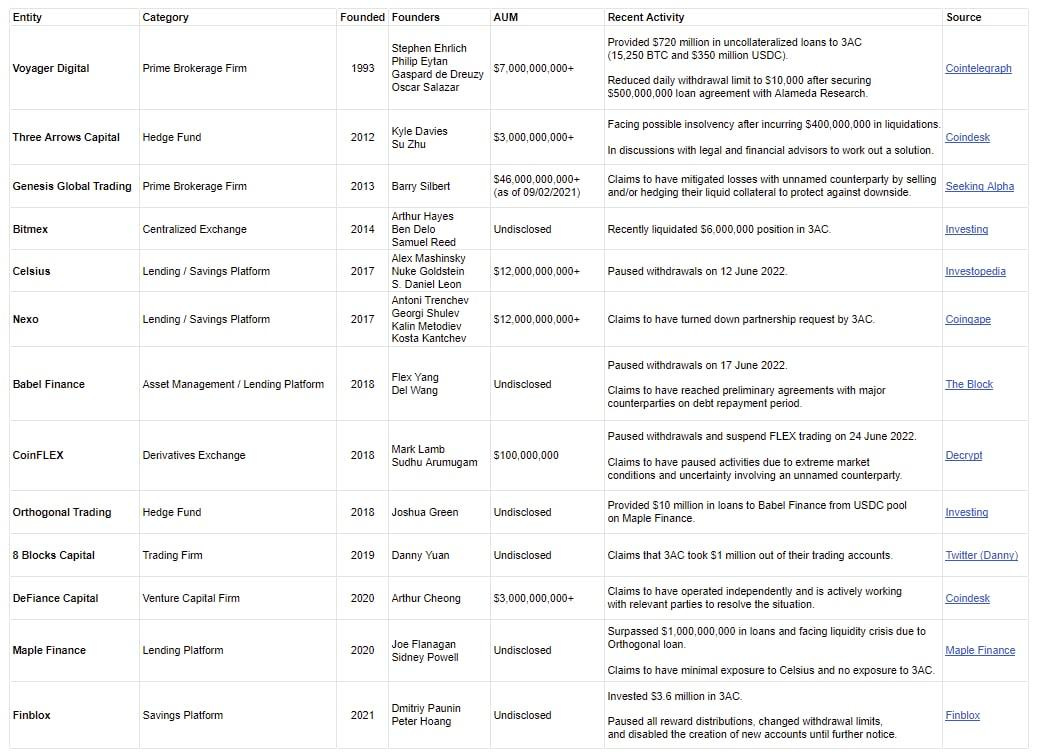Myth of Money: It's Bailout Season
Welcome to this week’s edition of Myth of Money, a weekly newsletter on the digital asset markets read by 12,000+ investors.
Disclaimer: The following is not intended as investment advice. Do your own research.
Dear Investors,
As market volatility continues, funds like 3AC are defaulting on loans, and crypto lenders continue to struggle across the board.
Lenders across the board, from Celsius to Voyager are struggling to retain enough liquidity to cover obligations to their depositors.
On Tuesday, the story that had everyone in the crypto space talking was the news of how BlockFi, a cryptocurrency exchange and digital wallet service provider, secured a $250 million revolving credit facility from leading crypto platform FTX.
Zac Prince, the CEO of BlockFi, confirmed the news in a Twitter thread, claiming the new flow of capital would bolster the firm’s balance sheet and strengthen the platform.
Sources say BlockFi was eager to accept, but its shareholders said “not so fast.”
According to Coindesk:
Cryptocurrency investment firm Morgan Creek Digital is attempting to raise $250 million from investors to purchase a majority stake in crypto lender BlockFi, a leaked investor call from Tuesday reveals.
Morgan Creek’s plan to rapidly assemble an equity offer was hatched in response to crypto exchange FTX’s Tuesday morning announcement that it would extend a $250 million credit line to BlockFi.
Morgan Creek Digital declined to comment. A person with knowledge of the effort said there are multiple venture capital funds that are exploring ways to provide equity financing to BlockFi as the lender struggles to stay afloat.
At stake is the ability of BlockFi’s existing shareholders, including longtime backer Morgan Creek, to recoup their investments.
“I’ve been making calls all day,” Morgan Creek Digital managing partner Mark Yusko said on the leaked call.
According to Yusko, the FTX credit line proposal had a catch for BlockFi’s existing shareholders: It gave FTX the option to buy BlockFi “at essentially zero price.” If FTX were to exercise said option, it would effectively wipe out all of BlockFi’s existing equity shareholders, including management and employees with stock options, as well as all equity investors in the company’s previous venture rounds.
However, Yusko said on the leaked call that BlockFi founders Zac Prince and Flori Marquez had a valid reason for preliminarily accepting the terms: Of the several emergency financing offers BlockFi received, FTX’s was the only one that would not subordinate client assets to the rescuer.
It is unclear if Yusko is going to be able to raise the funds on such short notice, but things don’t look good.
History Repeats Itself
We are likely to see additional bailout offers during this liquidity crisis. Bailouts have become commonplace since 1907 when J.P. Morgan and several other banks took it upon themselves to rescue the financial sector.
The story begins in October 1907 with the Heinze brothers, F. Augustus Heinze, who was one of the Copper Kings of Butte, Montana, founder and president of the Mercantile National Bank, and founder of United Copper, and his two brothers Otto and Arthur P., who owned a trading firm. They joined forces with Charles W. Morse, a New York businessman and speculator known as the “Ice King,” in an effort to corner the market on the stock of United Copper. The failure of the plan triggered the panic.
The panic on Wall Street led to runs by depositors on the banks associated with these men, including the Knickerbocker Trust Company, whose president, Charles T. Barney, was friendly with Morse. The bank was forced to close, but after their assets were bought they became the Columbia-Knickerbocker Trust Company. The New York Stock Exchange fell almost 50% from its peak of the previous year and things were precarious.
Financier J. P. Morgan stepped in and was able to stabilize the situation by pledging his own money, and he convinced other New York bankers to do the same. However, Morgan didn’t stop there. He also bought New York City bonds because it was clear that the city was at risk of becoming insolvent. Eventually, the Treasury Department was able to deposit money into bank coffers, and banks in turn assisted the New York Stock Exchange. While the immediate threat was contained, the ripples continued to affect the economy.
Source: Library of Congress
In 2022, Su Zhu of the 3AC made a degenerate play by taking out unsecured loans from various crypto companies, buying LUNA and UST, and staking on Anchor protocol. Su Zhu’s famous tagline was “Up Only”, but the “zhupercycle” came to an abrupt halt, rendering 3AC insolvent. Some CeFi services that had lent out assets to 3AC immediately shut off withdrawals and the contagion took hold. A CeFi panic developed, causing investors to pull out from lending sites that were rumored to have affiliations with 3AC. The crypto market began falling even harder as chain analysts tracked wallets of venture capitalists, institutions, and large hodlers. Liquidation was observed in these wallets and triggered a cascade of shorts. The fear index, almost at an all-time high, indicated that stakeholders, investors, and retail traders were unsure when an actual bottom would come in.
J.P. Morgan’s intervention and its effect
J.P. Morgan used his wealth and influence over Wall Street to save the U.S. financial system. Acting as a lender of last resort, he provided the liquidity needed to keep U.S. financial system afloat.
It seems that SBF is following in his footsteps by looking where he can provide liquidity while establishing favorable business terms for FTX.


This Week By the Numbers 📈
Top Stories 🗞️
Solana Labs Is Building a Web3 Mobile Phone
The Solana network is getting its own mobile phone called “Saga,” an Android handset by the blockchain’s key stakeholder, Solana Labs. The upcoming device – a modified OSOM handset with specialty crypto wallet functions and the “Solana Mobile Stack (SMS)” software development kit for Web3 programs – was announced Thursday at an event in New York. It will cost about $1,000 and be available for delivery in early 2023, Solana Labs CEO Anatoly Yakovenko said. The phone marks Solana’s biggest bet yet on mobile-focused growth. It will feature a Web3 dapp (decentralized app) store, integrated “Solana Pay” to facilitate QR code-based on-chain payments, a mobile wallet adapter and a “seed vault” that will store private keys deep within the recesses of the phone.
Snoop Dogg Files Trademark To Bring Virtual Cannabis To The Metaverse
According to trademark attorney Josh Gerben, it appears that the serial entrepreneur has filed a trademark for his virtual cannabis venture, “Uncle Snoop's”. Snoop Dogg made a filing claim on June 14 for “UNCLE SNOOP’s,” per Gerben. The brand will include “downloadable virtual goods, namely virtual cannabis, virtual smoking paraphernalia, and virtual clothing. Additionally, the brand is set to have a range of image, audio, and video NFTs plus pre-rolled hemp cigarettes.
Tether is Launching a Brand-New Stablecoin
Tether has announced it's launching a new stablecoin that's pegged to the British pound. The stablecoin issuer says GBPT will make its debut in early July, and it'll initially be supported by the Ethereum blockchain. Just like with its American cousin, one GBPT will equal £1. This isn't the first time that Tether has branched out beyond dollars. Beside USDT, its flagship stablecoin, the company also offers digital assets that are pegged to the euro, Chinese yuan, and Mexican peso. All of this comes after the United Kingdom announced that it plans to become a "global crypto hub" — and recognize stablecoins as a valid payment method. According to Tether, GBPT will deliver faster, less expensive transactions when compared with what's available right now, and this could be especially advantageous for cross-border payments.
Visa Launches Bitcoin and Crypto Enabled Cards in Latam
More global payment companies are taking an interest in mixing conventional fiat payments with more advanced solutions like cryptocurrencies. Visa, one of the leading payments companies, announced last week that it launched its first crypto-enabled cards in Latam, with the idea of enabling more people to use cryptocurrencies through its payments network. The company partnered with several startups in Latam, including Lemon Cash and Satoshi Tango in Argentina, and other startups including Crypto.com, Alterbank, and Zro Bank in Brazil. The functions that these new cards will feature include paying with crypto, purchasing crypto via Visa-enabled crypto outlets, and also receiving purchase cash back in bitcoin.
Solana NFT marketplace Magic Eden closes $130M Series B round at $1.6B valuation
On Tuesday, Magic Eden, a popular nonfungible tokens (NFTs) platform on the Solana (SOL) blockchain with 112,927 SOL ($4 million) in 24-hour trading volume, announcedthat it had closed a Series B round for $130 million. The funding round was led by investors such as Electric Capital, Greylock, Lightspeed Venture Partners, Paradigm and Sequoia Capital valued the firm at $1.6 billion. The newly-infused capital will be used to expand the company's primary and secondary marketplaces, explore multi-chain opportunities, allow new hirings, and for use in research and development. Since its inception in September 2021, the marketplace now receives an average of 22 million unique monthly sessions and sees over 40,000 NFTs traded daily. Magic Eden's Launchpad has also onboarded over 250 projects to date. In addition, it offers customization, marketing support, and operational execution to new NFT collections coming onto the primary market. Meanwhile, its secondary market covers over 7,000 listings and sees over 92% of all NFT volume on Solana.
Thank you for reading this week’s edition of the Myth of Money.🚀
Until next week,
Tatiana Koffman
By Tatiana Koffman
Hi there and thanks for reading. If you stumble upon my newsletter, you will notice that I write about money, economics and technology. I hold a JD/MBA and spent my career in Capital Markets working across Mergers & Acquisitions, Derivatives, Venture Capital and Cryptocurrencies. I believe in empowerment through closing the financial education gap and creating equality of opportunity for the next generation. I have invested in 20+ companies and funds. Check out my portfolio here.
Enjoyed your reading experience?
Follow me on Twitter.
Hit reply with your feedback and ideas :)
Share this post with others.
Disclaimer: This email does not contain financial advice and was created solely for informational purposes.
Received this email by accident? Unsubscribe below.





